|
|
|
Sort Order |
|
|
|
Items / Page
|
|
|
|
|
|
|
| Srl | Item |
| 1 |
ID:
108296


|
|
|
| 2 |
ID:
073977


|
|
|
|
|
| Publication |
2006.
|
| Summary/Abstract |
We offer a theory explaining how alliances as international security regimes reduce military conflict between member-states through their internal provision of information concerning national military capabilities. Bargaining models of war have shown that a lack of information about relative military capabilities functions as an important cause of war. We argue that alliances provide such information to internal participants, and greater knowledge within the alliance about member-state military capabilities reduces certain informational problems that could potentially lead to war. This internal information effect, however, is a conditional one. We posit that the information provided within the alliance matters most for dyads at or near power parity: the cases where states are most uncertain about who would prevail if a military conflict did emerge. In power preponderant dyads where the outcome of a potential military conflict is relatively certain, the internal information provided by military alliances becomes less important. Our statistical results provide strong support for these theoretical arguments.
|
|
|
|
|
|
|
|
|
|
|
|
|
|
|
|
| 3 |
ID:
097016
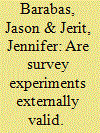

|
|
|
|
|
| Publication |
2010.
|
| Summary/Abstract |
Researchers use survey experiments to establish causal effects in descriptively representative samples, but concerns remain regarding the strength of the stimuli and the lack of realism in experimental settings. We explore these issues by comparing three national survey experiments on Medicare and immigration with contemporaneous natural experiments on the same topics. The survey experiments reveal that providing information increases political knowledge and alters attitudes. In contrast, two real-world government announcements had no discernable effects, except among people who were exposed to the same facts publicized in the mass media. Even among this exposed subsample, treatment effects were smaller and sometimes pointed in the opposite direction. Methodologically, our results suggest the need for caution when extrapolating from survey experiments. Substantively, we find that many citizens are able to recall factual information appearing in the news but may not adjust their beliefs and opinions in response to this information.
|
|
|
|
|
|
|
|
|
|
|
|
|
|
|
|
| 4 |
ID:
144798
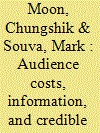

|
|
|
|
|
| Summary/Abstract |
Leaders who can accumulate audience costs can send costly signals that may help alleviate information problems associated with crisis escalation. We argue that research examining the effect of audience costs fails to appreciate the theoretical context in which audience costs matter. Audience costs may help alleviate information problems associated with international conflict. However, credible commitment problems are more central than information problems for some international conflicts. Theory does not expect audience costs to matter in this context; as a result, extant tests, and many criticisms, of the effect of audience costs on crisis escalation are flawed. We offer a more appropriate test of the effect of audience costs on crisis escalation. Consistent with extant theoretical arguments, we find that audience costs only reduce the likelihood of conflict when credible commitment problems are not the dominant concern motivating a dispute or crisis.
|
|
|
|
|
|
|
|
|
|
|
|
|
|
|
|
| 5 |
ID:
109996
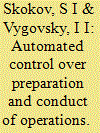

|
|
|
|
|
| Publication |
2011.
|
| Summary/Abstract |
The authors examine an automated control system for preparing and conducting military operations; and identify ways they consider essential for improving control efficiency.
|
|
|
|
|
|
|
|
|
|
|
|
|
|
|
|
| 6 |
ID:
100150
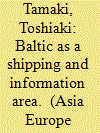

|
|
|
|
|
| Publication |
2010.
|
| Summary/Abstract |
In early modern times, the Netherlands imported grain from the Baltic, especially Poland, and re-exported it elsewhere in Europe. The Dutch shipping industry was extremely profitable, for transport costs were very high, and the number of Dutch ships was by far the largest among the European countries. Dutch prosperity was based on shipping of grain from the Baltic. Amsterdam was also a center of information because it was a port at which many ships stayed, and which attracted various merchants owing to its policy of religious tolerance. Much commercial information and know-how were accumulated in and spread from Amsterdam which contributed to the growth of the regional European economy from the Baltic because many merchants migrated to Northern Europe via the city, bringing with them the latest commercial techniques. Amsterdam therefore served as a core of Baltic integration in the early modern period, for it was a center of shipping and information.
|
|
|
|
|
|
|
|
|
|
|
|
|
|
|
|
| 7 |
ID:
079960
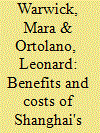

|
|
|
|
|
| Publication |
2007.
|
| Summary/Abstract |
The Shanghai Municipal Government's environmental complaints system allows citizens to report environmental problems to local authorities and provides timely feedback regarding how the complaint was resolved. Using both statistical data and case studies, we conduct a qualitative analysis of the system's costs and benefits as of early 2002. The analysis shows that the complaints system is an important, yet somewhat unreliable source of information about the many environmental problems not otherwise detected by regulators. Moreover, the opportunity cost of the system is significant; the system is dominated by nuisance complaints that are either trivial or without significance to environmental quality except at a very limited geographical scale. Analysis of patterns in the case studies provides the basis for constructing hypotheses concerning whether a particular pollution problem is likely to be the subject of a complaint. This offers insights into how the system could be improved so that the benefits of citizen involvement could be enhanced
|
|
|
|
|
|
|
|
|
|
|
|
|
|
|
|
| 8 |
ID:
163546


|
|
|
|
|
| Summary/Abstract |
Knowledge of mining is an important factor that can influence acceptance of activities conducted by the mining industry. However, understanding the objective knowledge of mining activities of the important stakeholder groups in mining is an issue that has been neglected. On the basis of an on-line survey focused on various target groups of stakeholders in Australia, we have examined a hypothesized model of factors that constitute knowledge of mining. The results show that knowledge of mining activities varies according to socio-demographic characteristics, experience of mining activities, and information sources about mining. Our findings highlight the key role of direct experience with mines and rehabilitation sites and the role of information in increasing knowledge of mining. In an effort to identify factors that frame acceptance of mining, the present study shows a new perspective by addressing objective knowledge of mining as an important asset that needs to be maintained and more widely spread.
|
|
|
|
|
|
|
|
|
|
|
|
|
|
|
|
| 9 |
ID:
149966
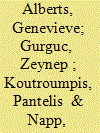

|
|
|
|
|
| Summary/Abstract |
This paper investigates the effects of information feedback mechanisms on electricity and heating usage at a student hall of residence in London. In a randomised control trial, we formulate different treatments such as feedback information and norms, as well as prize competition among subjects. We show that information and norms lead to a sharp – more than 20% - reduction in overall energy consumption. Because participants do not pay for their energy consumption this response cannot be driven by cost saving incentives. Interestingly, when combining feedback and norms with a prize competition for achieving low energy consumption, the reduction effect – while present initially – disappears in the long run. This could suggest that external rewards reduce and even destroy intrinsic motivation to change behaviour.
|
|
|
|
|
|
|
|
|
|
|
|
|
|
|
|
| 10 |
ID:
098744
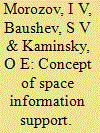

|
|
|
| 11 |
ID:
175056
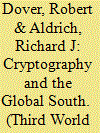

|
|
|
|
|
| Summary/Abstract |
For decades, espionage during the Cold War was often presented as a competition between East and West. The extent to which the Global South constituted the main battleground for this conflict is now being appreciated, together with the way coups and covert regime change represented a continuation of colonialism by other means. Recent revelations about the nature of technical surveillance and signals intelligence during this period paint an even more alarming picture. New research materials released in Germany show the ways in which Washington, London and even Moscow conspired to systematically attack the secure communications of the Global South. For almost half a century, less advanced countries were persuaded to invest significant sums in encryption machines that were adapted to perform poorly. This was a deceptive system of non-secrecy that opened the sensitive communications of the Global South to an elite group of nations, that included former colonial rulers, and emergent neo-imperial powers. Moreover, the nature of this technical espionage, which involved commercial communications providers, is an early and instructive example of digital global information inequality.
|
|
|
|
|
|
|
|
|
|
|
|
|
|
|
|
| 12 |
ID:
130659
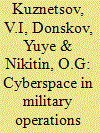

|
|
|
|
|
| Publication |
2014.
|
| Summary/Abstract |
The authors examine the relationship between battlespace, cyberspace, and information environment from the perspective of combat actions conducted by tactical military formations in our day.
|
|
|
|
|
|
|
|
|
|
|
|
|
|
|
|
| 13 |
ID:
170802
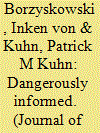

|
|
|
|
|
| Summary/Abstract |
A considerable literature examines the effect of voter information on candidate strategies and voter–politician interactions in the developing world. The voter information literature argues that information can improve accountability because more informed voters are harder to woo with traditional campaign tools, such as ethnic appeals and vote-buying. However, this literature has largely ignored the reaction of political candidates and thus may reach conclusions that are overly optimistic regarding the impact of information on electoral accountability. We argue that voter information can increase electoral violence in developing countries where politicians face fewer institutional constraints on their campaign tactics. When violence is used as a campaign strategy, more informed electorates are more at risk because they are harder to sway through alternative campaign techniques. Using data from 35 African countries, we show that respondents receiving their news predominantly from newspapers are a good proxy for informed voters because they differ in terms of their political attitudes from respondents consuming no news or receiving it via other channels. Combining the geo-coded survey data with pre-electoral violence event data, we find a robust positive association between newspaper readership and fear of and exposure to campaign violence. This finding contributes to the micro-foundations of election violence and adds a cautionary note for voter information programs.
|
|
|
|
|
|
|
|
|
|
|
|
|
|
|
|
| 14 |
ID:
044940
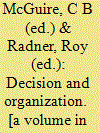

|
|
|
|
|
| Publication |
London, North-Holland Publishing Company, 1972.
|
| Description |
x, 361p.Hbk
|
| Series |
Studies in mathematical and managerial economics
|
| Standard Number |
0720433134
|
|
|
|
|
|
|
|
|
|
|
|
Copies: C:1/I:0,R:0,Q:0
Circulation
| Accession# | Call# | Current Location | Status | Policy | Location |
| 009656 | 658.403/MCG 009656 | Main | On Shelf | General | |
|
|
|
|
| 15 |
ID:
197848


|
|
|
|
|
| Summary/Abstract |
. This paper discusses Russia's experience related to the origin and development of geostrategy as a
branch of political science that promotes a state's national interests based on its economic and military might. It
formulates the goals and essential aspects of modern geostrategy in the interests of Russia's national security.
|
|
|
|
|
|
|
|
|
|
|
|
|
|
|
|
| 16 |
ID:
094305


|
|
|
|
|
| Publication |
2010.
|
| Summary/Abstract |
The purpose of this paper is to analyze Swedish households' willingness to increase their daily efforts to save electricity. The analysis builds on a broad theoretical framework, which embraces both economic and norm-based motivations in explaining household behavior. The paper pays particular attention to the role of information about the availability of different behavioral changes that can be undertaken at the household level. The empirical results are based on a postal survey that was sent out to 1200 Swedish households, and the econometric analysis is carried out within a so-called ordered probit framework. Our results indicate that costs, environmental attitudes and social interactions are all important determinants of electricity saving activities within Swedish households. We tested the hypothesis that information about available savings measures that is presented in a more concrete and specific way is more likely to affect (stated) behavior than is more general information, and the data collected support this notion. The paper ends by discussing some implications of these results for the design of future informative policy measures in the energy-efficiency field.
|
|
|
|
|
|
|
|
|
|
|
|
|
|
|
|
| 17 |
ID:
186812
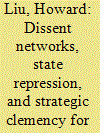

|
|
|
|
|
| Summary/Abstract |
Why do governments severely punish some dissidents while showing mercy to others? This study argues that when constrained by limited information on dissent, states have incentives to cast the net of repression wider by executing not just key dissent actors but also members closely connected to them to ensure demobilization. States also crave information, and granting clemency to defectors who bring in information improves state intelligence. Given that tips have different values, regimes will grant clemency to defectors who are closely connected to key dissent actors and possess high-value tips, allowing the state to pursue top fugitives and dissolve resistance more efficiently. Using newly declassified data on political victims during Taiwan’s White Terror authoritarian period, I find that the regime tends to execute both key actors (i.e., leaders and recruiters) and their closely connected members. Defectors who share information tend to receive mercy, but defectors closely connected to key actors are much less likely to face execution than less connected defectors. These findings shed new insight into the toolkit dictators use to gather intelligence on dissent and how strategic clemency induces defection and betrayal among dissidents, helping destroy dissent networks from within.
|
|
|
|
|
|
|
|
|
|
|
|
|
|
|
|
| 18 |
ID:
143149
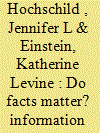

|
|
|
| 19 |
ID:
185982
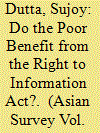

|
|
|
|
|
| Summary/Abstract |
I investigate to what extent India’s Right to Information Act is useful for poor households. Drawing on empirical data from central Uttar Pradesh, I study two categories of poor households—urban and rural—possessing Below Poverty Line cards. These cards entitle their holders to several subsidies, but they are poorly targeted: certain communities receive more cards, while most of the deserving poor do not receive them. The Act is meant to create space for democratization, enabling the poor to challenge local power holders; but there are obstacles to their taking advantage of it. They are scarcely educated, and unaware of the Act, and they get no support from government agencies responsible for implementing it. This has encouraged the use of manipulative tactics by local representatives and government bureaucrats seeking power, control, and domination. But the poor do find ways to receive their entitlements.
|
|
|
|
|
|
|
|
|
|
|
|
|
|
|
|
| 20 |
ID:
184753
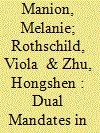

|
|
|
|
|
| Summary/Abstract |
democracies, the literature has failed to notice their existence in China, let alone theorize or analyze them. We turn to the political science literature on assemblies under authoritarianism to guide our analysis of survey data for 3,008 county congress delegates, half of whom are concurrent ones. We show that dual mandates amplify some voices and not others in ways consistent with two perspectives in the literature. Dual mandates amplify information from citizens at the grassroots upward toward governments: More delegates with deep community roots representing poor, rural, remote districts sit concurrently in county and lower-level congresses. Dual mandates also coopt influential groups posing a potential challenge to ruling party power: They amplify the influence of private entrepreneurs, more of whom sit concurrently in county and prestigious higher-level congresses.
|
|
|
|
|
|
|
|
|
|
|
|
|
|
|
|
|
|
|
|
|